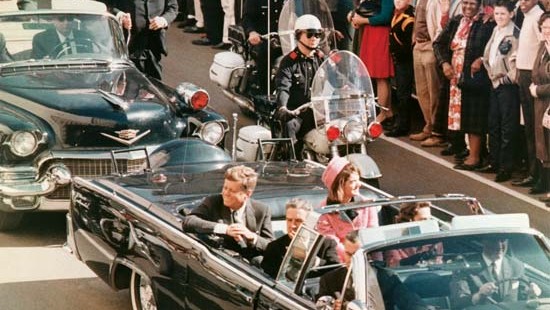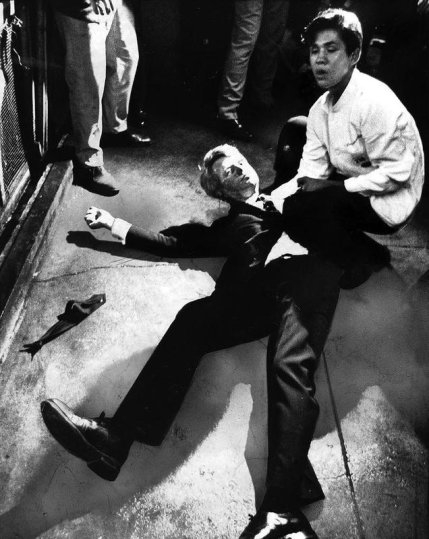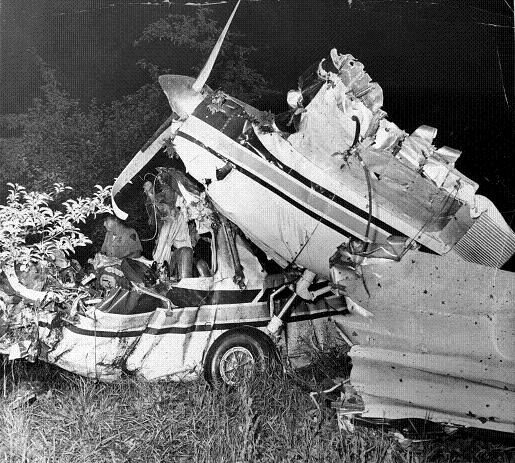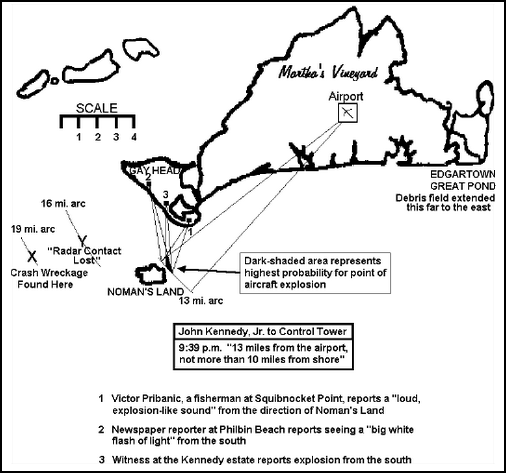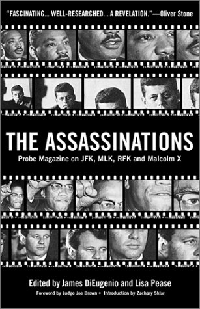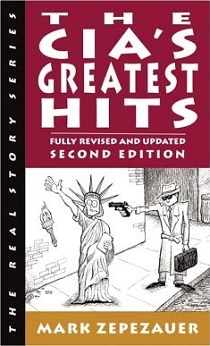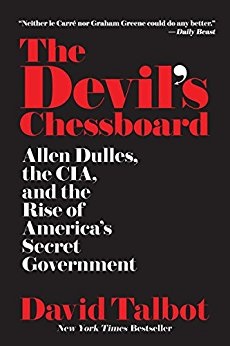|
Kennedy Curse or a Right-Wing Vendetta?
Why Tragedy Has Haunted America's First Family "A certain pattern -- something more profound than bad luck or coincidence -- must be at work."
The Kennedy Curse: JFK Assassination — November 1963
"Military and
intelligence officers did not take kindly to Kennedy's attempts to
restrain this powerful conglomeration. Kennedy angered
these men by refusing to use U.S. military power to salvage the Bay of
Pigs Invasion. Then he added fuel to the fire by rejecting
recommendations by the joint chiefs to bomb the missile emplacements in
Cuba and to refrain from signing a nuclear test ban treaty with the
Russians.... Some generals -- including Dallas mayor Earle Cabell's
brother, Gen. Charles P. Cabel -- even went so far as to brand Kennedy a
'traitor.' Cabell, after being fired by Kennedy as deputy director
of the CIA, resumed responsibilities in the Pentagon." "Bobby Kennedy came up talking to John Kennedy and saying, 'You know, if you go too far in negotiations with Kruschev and with the Communists, you're going to get assassinated. People in this country don't want the President of the United States to make deals with the Communists.'" "The ancient imperial capital [of Rome] ... was full of dark intrigue, treachery and gruesomely memorable characters. But it had nothing on Washington, our Rome on the Potomac.... JFK -- who was increasingly isolated from his top national security advisers in the Pentagon, CIA, and even the White House -- clearly sensed the mutinous mood in some corners of Washington. In conversations with friends, Kennedy raised the specter of an assassination or coup with disturbing frequency during his brief presidency." "In a remarkable passage in 'One Hell of a Gamble,' a widely praised 1997 history of the Cuban missile crisis based on declassified Soviet and U.S. government documents, historians Alexksandr Fursenko and Timothy Naftali wrote that on November 29, one week after the [JFK] assassination, Bobby Kennedy dispatched a close family friend named William Walton to Moscow with a remarkable message for Georgi Bolshakov, the KGB agent he had come to trust during the nerve-wracking back-channel discussions sparked by the missile crisis. According to the historians, Walton told Bolshakov that Bobby and Jacqueline Kennedy believed 'there was a large political conspiracy behind Oswald's rifle' and 'that Dallas was the ideal location for such a crime.'" "By Thursday, November 21, [Wayne] January and the Cuban had become close enough to talk somewhat freely. During their lunch break and after a period of silence, the Cuban looked at January and said: 'They are going to kill your President.' January could tell the man was not joking. He had shown no sign of being less than serious before this in any conversation. When January asked him why he was saying this, the Cuban talked about being involved in the Bay of Pigs and about being told how his friends had died because Robert Kennedy had talked John Kennedy out of sending the air support they had been promised for the invasion. He talked about the pain and the embarrassment of those involved. 'They are not only going to kill the President, they are going to kill Robert Kennedy and any other Kennedy who gets in that position.' January knew the man was serious, but it was too much for him to believe and he said so. The Cuban closed the conversation with, 'You will see.'" "Goddamn the Kennedys. First there was Jack, now there's Bobby, and then Teddy. We'll have them on our necks until the year 2000." "[William Sullivan] told me the last time I saw him -- he had lunch at my house -- he had been fired by Hoover and he was going into retirement -- he said that, 'Someday you will read that I have been killed in an accident, but don't believe it, I've been murdered,' which was a shocking thing to say." "The thing I am concerned about, and so is [Deputy Attorney General Nicholas] Katzenbach, is having something issued so we can convince the public that Oswald is the real assassin." For more information on the JFK assassination click here: Citizens for Truth about the Kennedy Assassination
The Kennedy Curse: RFK Assassination — June 1968 "I hope that someone shoots and kills the son of a bitch." "Do you know what I think will happen to Bobby? ... The same thing that happened to Jack." "I was in Dallas when we got the son of a bitch [JFK] and I was in Los Angeles when we got the little bastard [RFK]." "They're killing all the Kennedys."
"Subject to me getting elected [President], I would like to reopen the Warren Commission." According to Robert Kennedy's former press spokesman Frank Mankiewicz, when Robert Kennedy was asked at a campaign appearance, days before his assassination, whether he would reopen the investigation into the death of his brother JFK, he uttered a simple, one-word answer: "Yes." For more information, click below:
The Kennedy Curse: Senator Edward Kennedy — Two Near Fatal "Accidents" John Dean: ...if they get those bank records between the start of July of 1969 through June of 1971 ... there comes Chappaquiddick with a vengeance.... In July 1969, a year after Senator Robert Kennedy was assassinated, Senator Edward Kennedy's car went off a bridge at Chappaquiddick, killing his woman passenger. The following is a brief account:
This is a typical chronicle of the Chappaquiddick tragedy. However, given the likelihood of conspiracies in the assassinations of JFK and RFK -- and the right-wing's hatred of the Kennedys in general -- it is conceivable that Edward Kennedy was also the target of conspirators. In fact, Senator Edward Kennedy was involved in a near fatal "accident" before Chappaquiddick. On June 19, 1964, Kennedy's plane was en route to the State Democratic Convention in Springfield, Massachusetts. However, the plane never reached its destination; it crashed on final approach in an apple orchard. Kennedy's aide, Edward Moss was killed in the crash, along with the pilot, Edwin Zimny. Kennedy would spend weeks in a hospital recovering from a severe back injury, a punctured lung, broken ribs, and internal bleeding.
It should be noted that during this period, one bitter rival of the Kennedy brothers was the Republican Richard Nixon. Nixon was a favorite of America's right-wing, having taken a lead role in the Alger Hiss case and the Red Scare congressional hearings that preceded McCarthy. Later, Nixon would endear himself to right-wing Cuban exiles and their CIA sponsors for his hard-line position against Fidel Castro. Nixon had lost the presidential election to John Kennedy in 1960 and, for a time, it looked as if his political career might be over. However, by 1968, Nixon's fortunes had changed. He managed to win the Republican nomination and, in November 1968, he was elected President. Nixon's road to the White House was paved by the assassination of Democratic presidential candidate Robert Kennedy in June, five months earlier. Once in office, Nixon would use his position to wage a clandestine smear campaign against the Kennedys. The top field operatives in the White House campaign of dirty tricks were Watergate burglars E. Howard Hunt and G. Gordon Liddy. Before joining the Nixon administration, E. Howard Hunt was a political officer in the CIA, helping to stage coups in several foreign countries. Hunt also helped plan the Bay of Pigs invasion against Fidel Castro, developing close ties to many CIA-trained Cubans. On a more ominous note, Hunt has been accused of involvement in the assassination of John F. Kennedy, a charge which he denied for years, but finally acknowledged in a deathbed statement released in 2007. (see Dirty Politics -- Nixon, Watergate, and the JFK Assassination) G. Gordon Liddy was an FBI agent from 1957 to 1962 and was part of COINTELPRO, a program of surveillance and sabotage against domestic political dissidents. One of Nixon's first attempts to tarnish the Kennedy family was aimed at the deceased President John F. Kennedy. In 1971, the White House requested that E. Howard Hunt forge "...some [diplomatic] cables in order to blame John F. Kennedy for the death of the leader of South Vietnam [Ngo Dinh Diem] ... for the purpose of publishing them in Time and Life." (Source: New York Times, David Rosenbaum, 25 September 1973) However, most of Nixon's smear attempts were aimed at Senator Edward Kennedy. Edward Kennedy had survived the ordeal of Chappaquiddick and Nixon wanted to make sure that he was not left unscathed. The White House asked "retired" CIA officer E. Howard Hunt to obtain "...cartoons that had been prepared in the Central Intelligence Agency, political cartoons attacking Senator Kennedy, for use should Senator Kennedy at that time run for president of the United States." (Source: Plausible Denial, Mark Lane) Also, on a White House tape, Nixon can be heard telling his aides to place spies among a Secret Service detail assigned to protect Senator Kennedy in the hope of uncovering damaging information on Kennedy. Nixon says, "we might just get lucky and catch this son of a bitch -- ruining him." Nixon also directed two of his most ruthless aides, H. R. Haldeman and Charles Colson, to plant a false news story linking Arthur Bremer -- the man who shot presidential candidate George Wallace -- to Edward Kennedy. (Source: All the President's Men, Bob Woodward and Carl Bernstein) Along with the Kennedys, the Nixon administration targeted other people and organizations it didn't like -- "enemies" as the White House called them. Among these were Daniel Ellsberg who leaked the Pentagon Papers to the press; newspaper columnist Jack Anderson who Hunt and Liddy, at one point, marked for death; and the Brookings Institution, scheduled for a firebombing and break-in. (see box below)
When the Watergate story first broke, G. Gordon Liddy wondered if he himself might be a target of covert operatives out to protect higher-ups in the Nixon administration. Liddy said, "It occurred to me that people who would seriously consider the use of drugs against Ellsberg and the killing of Jack Anderson might well decide to go ahead with an assassination in my case." (p.257) The public might also wonder whether such people would have decided to go ahead with an assassination in another case: that of Senator Edward Kennedy, which brings us back to Chappaquiddick. (see box below)
"If he gets shot, it's too damn bad."
The Kennedy Curse: JFK Jr. Plane Crash — July 1999 "Why would anyone want to kill John Kennedy Jr.? There are many reasons. He was planning to run for national office according to Newsweek and People. In fact, he had already told Al Gore he would run for President in 2000 or 2004. He told friends he would have run for Senate in New York, but let Hillary [Clinton] run instead. And he could have won. He was the most popular man in the US. He was also the only Kennedy to ever acknowledge a conspiracy in his father's death. As the owner of an influential magazine, George, he had just launched an investigation into the death of his father."
"Kennedy, Jr. showed his interest in murders of state and covert operations by publishing an article [in his magazine, George] by Oliver Stone stating that in the course of history powerful men typically murdered their opponents, and that JFK had been dispatched this way. George also published "A Mother's Defense" by Guela Amir, the mother of Yigal Amir, who was convicted of assassinating Yitzhak Rabin, the Israeli prime minister who offended the Israeli far-right by wanting to trade land for peace much as JFK had offended -- amongst others -- the military industrial complex and the Council on Foreign Relations that wanted war in Vietnam and continued hostilities toward the USSR. Guela Amir revealed that her son had operated under the tutelage and training of a Shin Bet agent, Avishai Raviv, working for forces seeking to halt the peace process."
"If they're killing Kennedys, then my children are targets." "It's so easy to cover it up. The evidence is destroyed and everybody knows airplanes are fragile anyway, small airplanes in particular. So it's a very clean type of assassination, in terms of ways to do it, because the area where the plane crash happens can be quickly cordoned off ... and the evidence can be cleaned up very quickly, and most of it is destroyed anyway. But if there's anything left, it can be disposed of very, very quickly."
Kennedy Curse or a Right-Wing Vendetta? (Why Tragedy Has Haunted America's First Family) by Mark Tracy Did CIA Hawks Assassinate Ron Brown? The CIA School of Assassination at Fort Bragg The Right-Wing Shadow Government -- Treason on the Right 9/11 - Anatomy of a Great Deception "Real patriots ask questions." --Carl Sagan |
